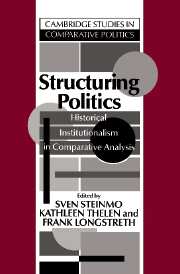Book contents
- Frontmatter
- Contents
- Preface
- List of contributors
- 1 Historical institutionalism in comparative politics
- 2 Labor-market institutions and working-class strength
- 3 The rules of the game: The logic of health policy-making in France, Switzerland, and Sweden
- 4 The movement from Keynesianism to monetarism: Institutional analysis and British economic policy in the 1970s
- 5 Political structure, state policy, and industrial change: Early railroad policy in the United States and Prussia
- 6 Institutions and political change: Working-class formation in England and the United States, 1820–1896
- 7 Ideas and the politics of bounded innovation
- 8 The establishment of work–welfare programs in the United States and Britain: Politics, ideas, and institutions
- Index
2 - Labor-market institutions and working-class strength
Published online by Cambridge University Press: 04 August 2010
- Frontmatter
- Contents
- Preface
- List of contributors
- 1 Historical institutionalism in comparative politics
- 2 Labor-market institutions and working-class strength
- 3 The rules of the game: The logic of health policy-making in France, Switzerland, and Sweden
- 4 The movement from Keynesianism to monetarism: Institutional analysis and British economic policy in the 1970s
- 5 Political structure, state policy, and industrial change: Early railroad policy in the United States and Prussia
- 6 Institutions and political change: Working-class formation in England and the United States, 1820–1896
- 7 Ideas and the politics of bounded innovation
- 8 The establishment of work–welfare programs in the United States and Britain: Politics, ideas, and institutions
- Index
Summary
The central question in this essay is simple yet important: Why are some working classes more organized than others? This phenomenon has since World War II shown increased variation among Western capitalist countries (von Beyme 1980; Wallerstein 1989). The latest figures show that unionization among these countries ranges from below 15% in France to 86% in Sweden (see Table 2.1). Among industrialized Western states hardly any other political variables of this kind vary to such an extent. In this essay I will equate degree of unionization with workingclass strength. It can of course be argued that working-class strength is also dependent on other variables such as party organization and cultural homogeneity. But following Marxist theory, unionization may be seen as the primary organization form of the working class and can thus be considered a basis for other forms of working-class strength, such as political and cultural organization (Olofsson 1979; Offe and Wiesenthal 1980).
The importance of the level of working-class organizational strength stems, inter alia, from the established positive correlation between union strength and the development of welfare-state policies. One can say that, with few exceptions, the stronger is the organization of the working class, the more developed the welfare state (Korpi 1983; Shalev 1983a, b; Amenta and Skocpol 1986; Noble 1988). But, critically, this correlation does not in itself show how the causal link between social policies and working-class formation operates.
- Type
- Chapter
- Information
- Structuring PoliticsHistorical Institutionalism in Comparative Analysis, pp. 33 - 56Publisher: Cambridge University PressPrint publication year: 1992
- 130
- Cited by



